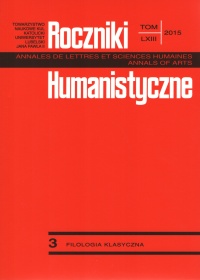Tentative division of Latin adverbs of degree
Abstract
The paper is an attempt of dividing Latin lexemes of the nonrelative degree of a property or state, which is expressed by gradable predicates, traditionally called adverbs of degree. The disitnction of four groups of degree indices is proposed, which characterize a property or state according to categories of intensity, completeness, sufficiency and excess, i.e. (1) Indices of intensity: a. intensifiers describing the high degree of a property or state (valde, multum, magnopere/magno opere, admodum, bene, male, sane, plane, non mediocriter, abunde, impense, vehementer, graviter, egregie, eximie, mire, mirifice, mirabiliter), b. disintensifiers describing the low degree of a property or state (non valde, non magnopere, non admodum, male, mediocriter); (2) Indices of completeness: a. describing the complete degree of a property or state (bene, male, plane, admodum, longe, omnino), b. describing the incomplete degree of a property or state (prope, paene, non plane); (3) Indices of sufficiency: a. describing the sufficient degree of a property or state (satis/sat), b. describing the insufficient degree of a property or state (non satis/sat, parum) and (4) Indices of excess: a. describing the excess of a property or state (nimis/nimium, oppido), b. describing the lack of excess of a property or state (non nimis).
References
Bałabaniak D.: Kategoria intensywności na tle wykładników stopnia, „Polonica” 28(2007), p. 13-21.
Bałabaniak D.: Polskie intensyfikatory leksykalne na tle wyrażeń gradacyjnych, Opole: Wydawnictwo Uniwersytetu Opolskiego 2013.
Bałabaniak D.: Semantyczne ograniczenia łączliwości intensyfikatorów leksykalnych, „Prace Filologiczne” 52(2007), p. 15-22.
Bańko M.: Wykłady z polskiej fleksji, Warszawa: PWN 2002.
Cuzzolin P.: Some remarks on the graded forms with sub- in Latin, „Journal of Latin Linguistics” 9(2005) Issue 1, p. 37-44.
Grochowski M.: Polifunkcyjność jednostek a ich homonimia (z punktu widzenia współczesnej leksykografii), „Prace Filologiczne” 33(1986), p. 35-42.
Grochowski M.: Wyrażenia funkcyjne. Studium leksykograficzne, Kraków: Wydawnictwo IJP PAN 1997.
Grzegorczykowa R.: Funkcje semantyczne i składniowe polskich przysłówków, Wrocław: Ossolineum 1975.
Górska M.: Cechy składniowe i semantyczne łacińskiego leksemu admodum, „Roczniki Humanistyczne” 58-59(2010-2011), z. 3, p. 197-210.
Górska M.: Łacińskie „prope” – jaka to część mowy?, „Roczniki Humanistyczne” 57(2009), z. 3, p. 131-145.
Górska M.: Łaciński leksem „sane” jako tzw. wyrażenie funkcyjne, „Roczniki Humanistyczne” 57(2009), z. 6, p. 11-27.
Górska M.: Stopniowanie a polifunkcyjność przysłówków łacińskich, „Roczniki Humanistyczne” 59(2011), z. 6, p. 7-28.
Górska M.: Typy łacińskich przysłówków oceniających, „Roczniki Humanistyczne” 62(2014), z. 3, p. 97-109.
Janus E.: Wykładniki intensywności cechy (na materiale polskim i rosyjskim), Wrocław: Ossolineum 1981.
Kühner R.: Stegmann C., Ausführliche Grammatik der lateinischen Sprache II. Satzlehre, Darmstadt: Wissenschaftliche Buchgesellschaft 1962.
Laskowski R.: Zagadnienia ogólne morfologii, in: Gramatyka współczesnego języka polskiego. Morfologia, R. Grzegorczykowa, R. Laskowski, H. Wróbel (eds.), 2. ed., Warszawa: PWN 1998, part 1, p. 27-86.
Menge H.: Lehrbuch der lateinischen Syntax und Semantik, Völlig neu bearbeitet von T. Burkard und M. Schauer, Darmstadt: Wissenschaftliche B 2000.
Pinkster H.: On Latin Adverbs, Amsterdam: North-Holland Publishing Company 1972.
Puzynina J.: O pojęciu intensyfikacji, „Roczniki Humanistyczne” 49-50(2000-2001), z. 6, p. 321-327.
Ricca D.: Adverbs, in: New Perspectives on Historical Latin Syntax, Volume 2: Constituent Syntax: Adverbial Phrases, Adverbs, Mood, Tense, F. Baldi, P. Cuzzolin (ed.), Berlin, New York: De Gruyter Mouton 2010, p. 109-192.
Risselada R.: The discourse function of sane: Latin marker of agreement, interaction and concession, „Journal of Pragmatics” 30(1998), p. 225-244.
Wajszczuk J.: O metatekście, Warszawa: UW 2005.
Wierzbicka A.: Dociekania semantyczne, Wrocław: Ossolineum 1969.
Wróbel H.: Nowa propozycja klasyfikacji syntaktycznej polskich leksemów, in: Studia z leksykologii i gramatyki języków słowiańskich: IV polsko-szwedzka konferencja slawistyczna, Mogilany, 1-3 października 1995, Kraków: IJP PAN 1996, p. 53-60.
Zaron Z.: Funkcjonalna klasyfikacja leksemów polskich (kolejna propozycja), in: Studia z gramatyki i leksykologii języka polskiego, M. Gębka-Wolak, I. Kaproń-Charzyńska, M. Urban (eds.), Toruń: UMK 2003, p. 179-188.
Copyright (c) 2015 Roczniki Humanistyczne

This work is licensed under a Creative Commons Attribution-NonCommercial-NoDerivatives 4.0 International License.





